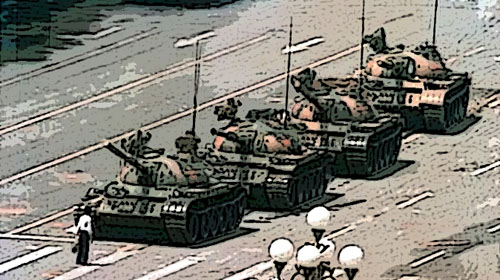
I recently came across an interesting by George Orwell. It made me think about Big Data.
It is a commonplace that the history of civilization is largely the history of weapons. In particular, the connection between the discovery of gunpowder and the overthrow of feudalism by the bourgeoisie has been pointed out over and over again. And though I have no doubt exceptions can be brought forward, I think the following rule would be found generally true: that ages in which the dominant weapon is expensive or difficult to make will tend to be ages of despotism, whereas when the dominant weapon is cheap and simple, the common people have a chance. Thus, for example, tanks, battleships and bombing planes are inherently tyrannical weapons, while rifles, muskets, long-bows and hand-grenades are inherently democratic weapons.т
Although Orwell, writing in 1945, was understandably focused on weapons, what he says may hold true for other technologies and tools. The photocopy machine, for example, was a tool for freedom in the old USSR, where it was used to produce Samizdat (underground dissident literature). On the other hand, the historian Lynn White Jr. advanced the famous thesis that the advent of the stirrup in medieval France concentrated power at the topтand in fact led to the entire social structure of Feudalism, because by allowing warriors to stand in the saddle it created a significant battlefield advantage for warriors on horseback over footmen, thereby requiring the creation of a special caste of mounted knights whose expensive equipment in turn required the support of a large pool of peasants.
Now we have Big Data analytics, one of the most recent tools with potentially portentous social effects to become available to humankind. The term тBig Dataт is often used broadly, to refer simply to the fact that companies and governments are collecting lots of personal information, but it also has a more precise meaning: the ability to mine large databases to discover subtle patterns, correlations, or relationships. This tool has sometimes been called the тmacroscopeттlike a telescope or microscope, except providing the ability to make patterns visible to us that our brains canтt perceive on their own because the scales involved are too subtle, large, or spread out.
So which way will Big Data break in terms of freedom? Unfortunately, there are a lot of reasons to think that overall, despite many good uses, this technology may be more like a tank than a copy machineтthat it may shift power away from individuals and towards large institutions such as companies and government agencies.
Who has the ability to gather large data sets? Generally, itтs large institutions, which are the only ones in a central position that lets them collect information from large numbers of people. Target Corporation is in a position to figure out that purchases of scent-free lotion and cotton balls , but ordinary individuals canтt possibly perceive such connections.
And, as Iтve written about before, access to those kinds of insights puts already powerful institutions in a position to know things about individualsт desires, fears, weaknesses, and ability to payтand thereby increases their ability to manipulate and control. It threatens to let government agencies or companies pursue their interests (such as security or profits) without having to worry about questions of fairness toward individualsтfor example, when people can be watch-listed in secret and without recourse, or tagged with a , based on correlations in large data sets that may be statistically valid from the top-down standpoint of the institution but still, for the individual, constitute guilt by association.
Of course the effects of particular tools and technologies are not always open-and-shut; often they are contested. Weтre seeing that play out today with regard to video surveillance, for example. Police departments are increasingly putting video surveillance cameras up in our public spacesтoften entire networks of them (despite the fact that every day there is less and less reason to do so). But at the same time, individuals are using their own cameras to record what the police doтand too often finding police attempting to (mis)use their authority to stop them from doing so. And into the middle of this contested space comes the far more ambiguous police body cameras, which could serve one function or the other depending on the nitty-gritty details of the rules governing their deployment.
How could Big Data analytics help individuals? In theory, where data sets are made available to all, they could expand individualsт access to information about the world and enable oversight over their government or companies. Big Data could also help empower individuals by allowing them to analyze their own data.
But unfortunately transparency is usually a hard-fought resultтnormally institutions fight to keep their data to themselves. And sometimes there will be privacy issues that make opening up databases legitimately problematic.
What would help in all this would be a data protection regime governed by the Fair Information Practice Principles (FIPPs), in which owners of data are required to specify the purpose of their data collection, collect only the data needed for that purpose, and use it for no new purposes without permission. Unfortunately, while such rules are in effect in most advanced economies, there is no sign that the United States will adopt them any time soon.
More than anything all of this reinforces the importance of individuals having control over the collection of data about them in the first place. Once the details of our activities get sucked into large databases, it is in many ways too late. One result of increasing awareness of Big Data analytics will likely be that people learn to be more careful about letting themselves be tracked, and to push back against the many ways in which they are pressured or forced to allow it. Hopefully that pushback will come before Big Data tilts power too far toward big institutions.


